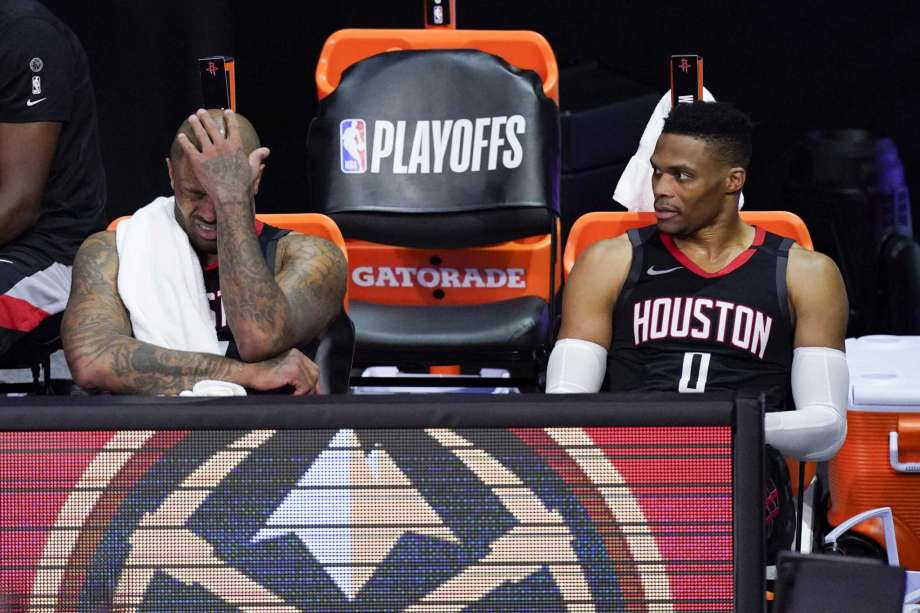
- Foreign Policy - August 9, 2021
- Rebounding For The Win - July 23, 2021
- NBA Legacy – Rising Sun - July 16, 2021
The culmination of the Houston Rockets’ season was a little less than fuel propulsion driven. In what started out to be a series statement win by upending the Los Angeles Lakers in game one, it ended up fizzling out in a four game losing streak that sent the Rockets back to Mission Control.
Although Houston’s offense can be very eye catching and has some sound principles, they don’t seem to capitalize on every aspect of it as they prefer to go on three-point scoring binges without utilizing the empty real estate it provides for them.
Basketball is a game of balance from many different facets, one of which is floor balance. It may not be necessary to plant a big man on the block, but to under utilize the very advantage your offense creates seems to be a little myopic for a team who intends to make a run for a championship.
No one in the key should allow for more back door cuts and wide open driving lanes to the basket. As a rule of thumb, the playoffs become a chess match contingent on who adapts the quickest and most efficiently.
Another aspect of the game is movement off of the ball. Houston has the bad habit of standing around the perimeter while waiting for an opportune three-point attempt facilitated through drive-and-kick or ball reversals. All of their half court offensive output comes exclusively from on the ball action.
No where was this more apparent than when the Lakers made its defensive adjustments in game two and took the rest of the series away from the Rockets. Utilizing well-timed traps on James Harden and a cascading series of perimeter rotations, the Lakers chased the Rockets off of the three point line, causing their offense to stall in key moments of the game.
It is in these particular moments that Russell Westbrook should have been more of a playmaking asset with his explosive athleticism but he struggled to get going, only averaging five assists with four turnovers, while only shooting 26% from behind the arc for the series.
Even when the Lakers decided to go smaller than normal, the Rockets still had problems with their front court length of LeBron James (6’9”), Anthony Davis (6’10”), Kyle Kuzma (6’8”) and Markieff Morris( 6’8”). The Lakers out performed the Rockets by out rebounding them 267-209, which led to outscoring them on the break 84-31, while accumulating a 246-174 advantage when it came to points in the paint.
Rebounding was always the concern that was going to make or break the productivity of their small line up, in all reality, as there are not many truly skilled post men that could exploit P.J. Tucker’s size disadvantage. In the previous series versus the Oklahoma City Thunder, every game that Houston lost, they were out rebounded by them.
Mike D’Antoni’s offensive ideology put an unorthodox stress on typical NBA defensive principles and rotations, but height combined with athleticism is still a premium in this sport. In 2012, he was quoted as saying that the post game is one of the least efficient plays in basketball. But how much more economical is iso-ball?
Whether you pound the dribble on the block or you put on a dribbling exhibition from behind the three point line, the rest of the players are still standing in place watching. As a result, it was apparent that the rest of the team seemed reluctant but mostly uncomfortable attempting to do more than just swing the ball around for the open three pointer.
Amidst the Lakers’ defensive scheme was the fact that Harden, as well as Westbrook, didn’t appear able to create any easy looks close to the basket for the Rockets. What is required of primary ball handling guards among the chaos is the ability to find passing creases, utilizing probing eyes and steady well-timed dribbling attacks. Encouraging players to flash at least closer to the key would simplify this process.
In the aftermath of a quick Western Conference Semi-Final exit, D’Antoni announced that he would not be returning for another season with Rockets. Houston, we have a problem.




